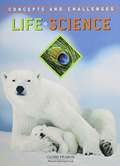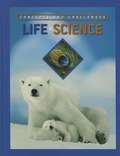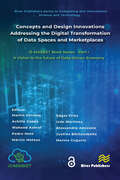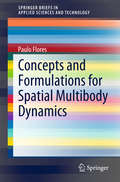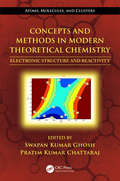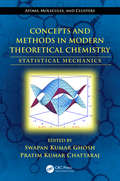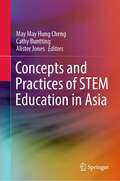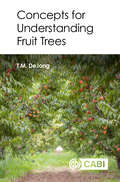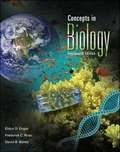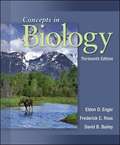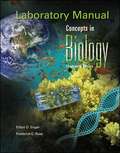- Table View
- List View
Concepts and Challenges in Life Science
by Leonard Bernstein Martin Schachter Alan Winkler Stanley WolfePeople are naturally curious. They want to understand the world around them. They want to understand what makes flowers grow and how their own bodies work. The field of science would probably not exist if it were not for human curiosity about the natural world. People also want to be able to make good guesses about the future. They want to know when it will rain again and which nutrients in soil grow the best crops.
Concepts and Challenges in Life Science
by Leonard Bernstein Martin Schachter Alan Winkler Stanley WolfeAmong the topics broadly covered in this book include scientific methods, living things, ecology, cells, tissues, organs, classification, organisms, plants, animals, nutrition and digestion among others.
Concepts and Challenges in Life Science (Revised 3rd Edition)
by Leonard Bernstein Martin Schachter Alan Winkler Stanley WolfeThis text book contains topics on Scientific methods and skills, Needs of living things, Ecology, Cells, Tissues, and Organs, Classification, Simple organisms, Plants, Plant structure and function, Animals without backbones, Animals with backbones , Nutrition and digestion, Support and movement, Transport, respiration and excretion, Regulation and behavior, Health and disease, Reproduction and development, Heredity and genetics and Change through time.
Concepts and Challenges in Physical Science
by Leonard Bernstein Martin Schachter Alan Winkler Stanley WolfeThis textbook contains lessons on Scientific Methods and Skills; Force; Energy and Work; Motion; Machines; Heat; Waves; Sound; Light; Electricity; Magnetism; Matter; Density; Atoms; Compounds and Mixtures; Chemical Formulas; Chemical Reactions; Metals; Solutions; Suspensions; Acids, Bases, and Salts, etc.
Concepts and Challenges in Physical Science
by Leonard BernsteinPhysical science is the study of both physics and chemistry. You will learn about new concepts while studying the book. What do you think are some other things that you will study in physical science?
Concepts and Challenges in Physical Science (Revised 3rd edition)
by Leonard Bernstein Alan Winkler Stanley Wolfe Martin SchachteImportance of Physical Science-- why should you study physical science? Physical science is an important part of your everyday life. It is difficult to think of anything that does not involve physical science and the discoveries of physical scientists. For example, each year seat belts save thousands of lives. Seat belts are based on the laws of motion. The discoveries of physical scientists also have resulted in nuclear energy. Nuclear energy has both problems and benefits. Physical scientists are constantly working to solve the problems related to nuclear energy. Their solutions may someday solve the world's energy problems.
Concepts and Challenges: Chemical Changes
by Leonard Bernstein Martin Schachter Alan Winkler Stanley WolfeIn this book, you will use a variety of science process skills to understand the facts and theories in physical science.
Concepts and Challenges: Earth Science
by Martin Schachter Alan Winkler Stanley WolfeThe topics covered in this book include the earth, lithosphere, hydrosphere, atmosphere and space.
Concepts and Challenges: Earth Science (4th Edition)
by Leonard Bernstein Martin Schachter Alan Winkler Stanley WolfeThis textbook contains unit lessons on Introduction to Earth, The Lithosphere, The Hydrosphere, The Atmosphere, Planet Earth, Earth and Space. Earth Science Features include Hands-On Activity, Hour Do They Know That? People in Science, Integrating the Sciences, Real-Life Science, Science and Technology, Investigate and Web InfoSearch.
Concepts and Challenges: Earth and Space
by Leonard Bernstein Martin Schachter Alan Winkler Stanley WolfeIn this book, students will use a variety of science process skills to understand the facts and theories in Earth and Space science.
Concepts and Challenges: Energy
by Leonard Bernstein Martin Schachter Alan Winkler Stanley WolfeIn this book, students will use a variety of science process skills to understand the facts and theories in physical science.
Concepts and Challenges: Life Science (4th Edition)
by Leonard Bernstein Martin Schachter Alan Winkler Stanley WolfeStudents will use a variety of science process skills to understand the facts and theories in life science.
Concepts and Challenges: Matter
by Leonard Bernstein Martin Schachter Alan Winkler Stanley WolfeScience process skills allow you to think like a scientist. They help you identify problems and answer questions. Sometimes they help you solve problems. More often, they provide some possible answers and lead to more questions. In this book, you will use a variety of science process skills to understand the facts and theories in physical science
Concepts and Challenges: The Diversity of Life
by Leonard Bernstein Martin Schachter Alan Winkler Stanley WolfeScience textbook about classifying plants and animals.
Concepts and Design Innovations addressing the Digital Transformation of Data Spaces and Marketplaces: i3-MARKET Book Series - Part I: A Vision to the future of Data-Driven Economy (River Publishers Series in Computing and Information Science and Technology)
by Martín Serrano Achille Zappa Waheed Ashraf Pedro Maló Márcio Mateus Edgar Fries Iván Martínez Alessandro Amicone Justina Bieliauskaite Marina CugurraIn the first part of the i3-MARKET Book series we begin by discussing the principles of the modern data economy that makes readers more aware about the value of the data that is produced everyday by individuals and also in a collective manner, i.e. in an industrial manufacturing plant, a smart city full of sensors generating data about the behaviours of the city and their inhabitants and/or the wellbeing and healthcare levels of a region or specific locations. Data, and the use of it, is one of the most disruptive areas in today’s global economy, particularly with the value that large corporations have embedded in their solutions and products because of their use of data from every individual.
Concepts and Formulations for Spatial Multibody Dynamics (SpringerBriefs in Applied Sciences and Technology)
by Paulo FloresThis book will be particularly useful to those interested in multibody simulation (MBS) and the formulation for the dynamics of spatial multibody systems. The main types of coordinates that can be used in the formulation of the equations of motion of constrained multibody systems are described. The multibody system, made of interconnected bodies that undergo large displacements and rotations, is fully defined. Readers will discover how Cartesian coordinates and Euler parameters are utilized and are the supporting structure for all methodologies and dynamic analysis, developed within the multibody systems methodologies. The work also covers the constraint equations associated with the basic kinematic joints, as well as those related to the constraints between two vectors. The formulation of multibody systems adopted here uses the generalized coordinates and the Newton-Euler approach to derive the equations of motion. This formulation results in the establishment of a mixed set of differential and algebraic equations, which are solved in order to predict the dynamic behavior of multibody systems. This approach is very straightforward in terms of assembling the equations of motion and providing all joint reaction forces. The demonstrative examples and discussions of applications are particularly valuable aspects of this book, which builds the reader's understanding of fundamental concepts.
Concepts and Methods in Modern Theoretical Chemistry: Electronic Structure and Reactivity
by Swapan Kumar Ghosh Pratim Kumar ChattarajConcepts and Methods in Modern Theoretical Chemistry: Electronic Structure and Reactivity, the first book in a two-volume set, focuses on the structure and reactivity of systems and phenomena. A new addition to the series Atoms, Molecules, and Clusters, this book offers chapters written by experts in their fields. It enables readers to learn how co
Concepts and Methods in Modern Theoretical Chemistry: Statistical Mechanics
by Swapan Kumar Ghosh Pratim Kumar ChattarajConcepts and Methods in Modern Theoretical Chemistry: Statistical Mechanics, the second book in a two-volume set, focuses on the dynamics of systems and phenomena. A new addition to the series Atoms, Molecules, and Clusters, this book offers chapters written by experts in their fields. It enables readers to learn how concepts from ab initio quantum
Concepts and Methods of 2D Infrared Spectroscopy
by Peter Hamm Martin Zanni2D infrared (IR) spectroscopy is a cutting-edge technique, with applications in subjects as diverse as the energy sciences, biophysics and physical chemistry. This 2011 book introduces the essential concepts of 2D IR spectroscopy step-by-step to build an intuitive and in-depth understanding of the method. This unique book introduces the mathematical formalism in a simple manner, examines the design considerations for implementing the methods in the laboratory, and contains working computer code to simulate 2D IR spectra and exercises to illustrate involved concepts. Readers will learn how to accurately interpret 2D IR spectra, design their own spectrometer and invent their own pulse sequences. It is an excellent starting point for graduate students and researchers new to this exciting field. Computer codes and answers to the exercises can be downloaded from the authors' website, available at www. cambridge. org/9781107000056.
Concepts and Practices of STEM Education in Asia
by Alister Jones Cathy Buntting May May Hung ChengThe purpose of this edited book is to enrich the literature related to STEM education at kindergarten, primary and secondary levels in Asia, with particular attention given to the analysis of the educational context in a number of Asian countries, including STEM-related policies, pedagogical practices, and the design and evaluation of STEM programmes. The discussions look into impacts on student learning outcomes and the ways in which STEM education is catering for schools and students’ interests and needs. The contributors are experts in STEM education or are leading major research and development projects in STEM in their regions. The book’s first section is focused at the macro-level on the conceptualization and formulation of STEM education policies in different regions, contributing to our understanding of the current status of STEM education in Asia. The second section examines some features of STEM learning and teaching at the classroom level and includes studies on student learning in STEM programmes. Pedagogical innovations implemented in different parts of Asia are also reported and discussed. The third section moves to teacher education and teacher professional development. It discusses practices of teacher professional development in the region and reports on current provisions as well as challenges. Together, the contributions from different Asian regions invite researchers and educators to learn from effective STEM practices, and point out areas for further development.Chapters "An Overview of STEM Education in Asia" and "STEM Teacher Professional Development for Primary School Teachers in Hong Kong" are available open access under a CC BY 4.0 license at link.springer.com.
Concepts for Understanding Fruit Trees (CABI Concise)
by Theodore DeJongAnyone who observes fruit trees may wonder how or why they behave in specific ways. Some trees grow upright while others have a spreading habit. Some produce many flowers and small immature fruit only to drop most of the fruit later on; others grow more strongly on their sunny side than their shady side. It is common to ascribe such behavior to the tree as a whole and state that trees preferentially "allocate" resources to specific organs. However, this is the wrong approach to understanding tree functioning and behavior. Trees are not in control of what they do. What trees do and how they function is shaped by the individual organs that make up the tree, not by the tree as a whole. The genetic code only indirectly determines the habit, structure and behavior of a tree by defining the behavioral and functional limits of the component organs, tissues and cells. Unlike animals that have a mechanism for collective control of the whole organism - a central nervous system - trees (and plants in general) are more appropriately considered as collections of semi-autonomous organs. These organs are dependent on one another for resources, such as water, energy and nutrients, but control their own destiny. This book presents a clear set of integrative concepts for understanding the overall physiology and growth of temperate deciduous fruit trees. The emphasis is on overarching principles rather than detailed descriptions of tree physiology or differences among the numerous species of fruit trees. Although the focus is on deciduous fruit trees, many aspects apply to evergreen fruit trees and trees that grow naturally in unmanaged situations. Highly relevant for students and researchers in pomology, horticulture and plant sciences, the book is also suitable for practitioners, extension staff, and novice fruit tree growers.
Concepts in Biology
by Eldon D. Enger Frederick C. Ross David B. Bailey'Concepts in Biology ' is an introductory book to students that covers all the main areas of study in biology from cells through ecosystems .
Concepts in Biology (13th edition)
by Eldon D. Enger Frederick C. Ross David B. BaileyThis book comprises six parts the contents of which include Cornerstones Chemistry, Cells, and Metabolism, Molecular Biology, Cell Division, and Genetics, Evolution and Ecology, The Origin and Classification of Life and Physiological Processes.
Concepts in Biology Lab Manual
by Eldon D. Enger Frederick C. RossThe exercises constituting this laboratory manual are intended to supplement the text Concepts in Biology.
